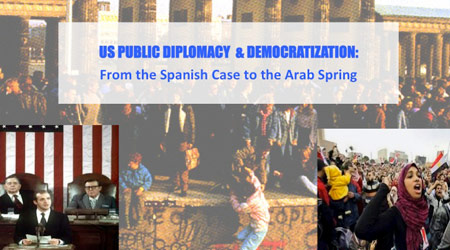U.S. Public Diplomacy and Democratization

From the Spanish Case to the Arab Spring.
The Portuguese revolution of April 1974, the end of the Greek dictatorship in July of that year, and the Spanish transition to democracy in 1975 have been commonly considered part of the "Third Wave of Democratization." This term was coined by Samuel P. Huntington right after the fall of the Berlin Wall and likewise used in order to explain the transition to democracy in the former European satellites of the Soviet Union in the early 1990s. More recently, some scholars have argued that the riots and demonstrations in the Middle East (Arab Spring) could be understood as an "emerging fourth wave."
U.S. Public Diplomacy efforts to promote and to spread the American political model might have played an important role in these events. This conference aspires to be a platform for an interdisciplinary dialogue between historians of the U.S. Information Agency, the U.S. Educational Exchange Programs, and Political Scientists. Scholars will discuss the connections, consequences, and weakness of that supposed causality.
- Chair: Henry Hale, Director of the Institute for European, Eurasian and Russian Studies.
- Organizers: Francisco J. Rodríguez (George Washington University), Sean Aday (George Washington University) and Lorenzo Delgado (Instituto de Historia, CCHS-CSIC).
- Sponsors: The Elliott School of International Affairs; CCHS-CSIC; The Millar Family Fund; Institute for Public Diplomacy and Global Communication-GWU; Instituto Franklin-Universidad de Alcalá.
- Sketching the future
- Washington, D.C.
- Nov 14, 2011
- 09:30 am – 04:00 pm
Venue
Lindner Family Commons (6th Floor), 1957 E St NW, Washington, DC 20052
View on Google Maps